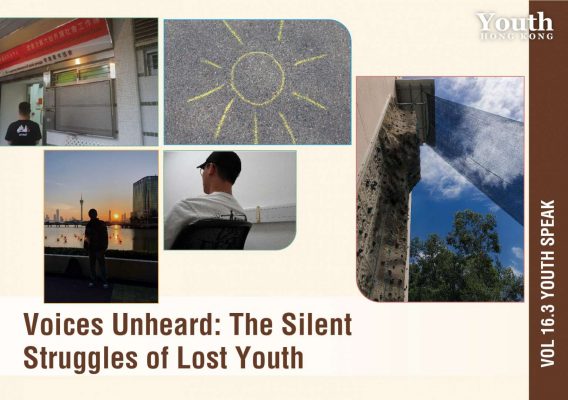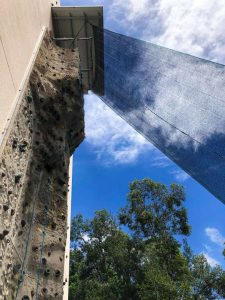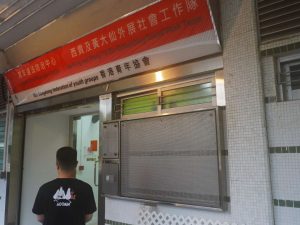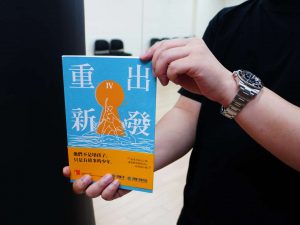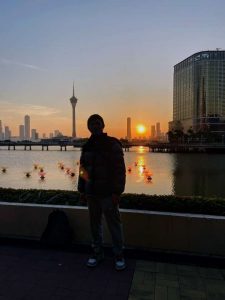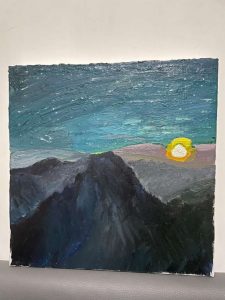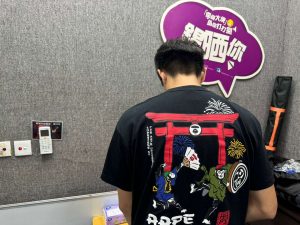//16.3 Youth speak
Voices Unheard:
The Silent Struggles of Lost Youth
by Mia Yao, Skarloey Hui, Cherry Wai and Lakshmi Jacota
While each of these five stories has a common thread of estrangement from their families, finding friendships in gangs and a descent into criminality, these young people also share their journeys of reconciliation, redemption and reconnection.
Climbing to the top
Jeremy, 17
Ascending higher and higher on a climbing wall, a young boy gazes out at a building a few kilometres away, counting the floors from the top as he tries to locate a specific window. He finds what he is looking for and is flooded with emotion.
The climbing facility is at the Tuen Mun Children and Juvenile Home and the climber is a 17-year-old serving his probation post detention.
A school dropout, an associate of gangs and a driver of stolen vehicles, Jeremy was charged with driving without a license and was in detention for nearly a year, before being sent to the Home.
The view from that climbing wall sparked the turning point for him; he was determined to start anew.
What led him to this state of affairs was a home life where he hadn’t been particularly close to his parents. His father worked in Shenzhen and, during the pandemic, could only return to Hong Kong once in six months. However, once he was arrested, the relationship began to heal. “It was heartbreaking to see my parents each time they visited. I cherished each moment that I was able to see them.” His once estranged family became his biggest pillar of support.
Life in the Home was characterised by a dull, monotonous routine. “I couldn’t tell exactly when I got up every day because there was no clock or window inside the room,” he said. “I was assigned work in the morning. After breakfast, there were Chinese, English and math classes, and sports, like climbing. I then take a shower, have lunch, watch TV, and go to sleep. There was no phone and zero entertainment but books and TV. It became normal in a way that seems boring today.”
“I think the point when I realised the gravity of my actions was one night when I couldn’t sleep. I was wide awake from 9:00 p.m. to 5:00 a.m. Without a phone or anything else, all I could do was lie there, look at the ceiling and think. I remembered my aunty, who raised me and treated me so well and I just felt so sorry for all that I had put my family through.”
“I would ask the officer if I could stay at the top a bit longer, just to look at the building where I used to live. I felt like crying.”
“I was interested in sports and so I joined climbing. It was more than just physical exercise, because when I could look out of the window and see my old flat, I was overwhelmed. I would ask the officer if I could stay at the top of the frame a bit longer, just to look at the building and window where I used to live. At that very moment, I felt I was about to cry.”
Looking back, Jeremy feels a mix of regret and gratitude. When asked whether he would prefer to erase that part of his life, he nodded but admitted that he feels lucky enough to have received so much from his family, his community and even his school – with all giving him the support and encouragement to start again.
“My life is really like climbing up the wall. From below, it may look steep and high, but once you reach the top, you feel a great sense of accomplishment. After enduring hardships – and maybe setbacks – sweetness follows, and you realise that anything is possible.”
Everything has consequences
Ah-Tai, 23
For the past nine months, Ah-Tai has spent ten hours a day driving an 18-ton vehicle across the city. His daily routine, though sometimes repetitive, stands in stark contrast to his past.
Like many of his friends, Ah-Tai was drawn to the excitement and fun of doing something illegal. When he was only ten, he joined a boxing gym with his father and quickly found himself surrounded by other thrill-seekers. In high school, he started hanging out with these young people, some of whom were involved in gangs. After school, he frequented his fellow boxers’ “secret dens,” places where drugs, alcohol, and tobacco were readily available, almost like “a buffet.” This gang life was something that Ah-Tai found himself slowly getting immersed into. He ended up spending most of his free time fighting and doing favours for his “brothers” to gain their approval and respect. By Form 3, he was expelled from school for “inappropriate behaviour.” A consequence of his actions.
By this time, he had become distant from his family, only speaking to them when he needed money. By the time he was arrested, his parents weren’t at all surprised. “I realised that I was rebelling against how ‘normal’ my family was. I wanted something more exciting. I didn’t have a sense of belonging among ‘normal’ people around me. I couldn’t understand them, nor them me. We were just on different wavelengths.”
This sense of feeling “different” from other people was something that was reinforced by what he believed others thought of him. He also attributed it as the root cause of having the police constantly stop him and check his ID. “It was because of the “smell of bad guys” in my appearance. So, it was easy, then, to fall into a lifestyle where I didn’t have to think about the future or take responsibility for my behaviour and actions. It seemed – at the time – a good life.”
“I was rebelling against how ‘normal’ my family was. I wanted something more exciting.”
Things changed when his father told him how worried his mother was about him; about how she’d cry every night. Ah-Tai felt remorseful and one night, unable to sleep himself, vowed to be different.
The transformation and growing self-awareness were neither sudden nor easy. He is still a work in progress, but feels the situation is slowly improving. Fortunately, two old friends, with similar experiences, remain close to him and they all support each other in what has become a shared journey to reform.
Now, with a greater sense of responsibility, Ah-Tai has given up that “glamorous world” of drugs, alcohol, triads, and violence. Instead, he is learning to manage his anger and look forward. When asked what he would tell young people like him, he said, “Think twice before acting. Everything has consequences which you must consider first. Don’t ruin yourself and your future.”
Go home early
Ah-Lok, 18
Three years ago, when just 15, Ah-Lok found himself in custody, sentenced to over a year at a rehabilitation home, where his life followed a strict routine. Every day, he had to awaken early and attend regular academic classes, after which there was time for board games with roommates, reading the Bible and watching movies. There were also other non-traditional offerings, including art therapy workshops, photography and cake-making, skills he continues to practice.
Recalling his past life, where his so-called friends led him down a path of fighting, smoking, stealing and drug use, he frequently found himself in and out of police stations. “These actions not only affected me, but they also added to the strain I already had with my family. I was unhappy at home and preferred to stay outside. My parents weren’t together and my mother and I rarely communicated.”
Being released was not easy and Ah-Lok found it very difficult to adapt. He struggled with most simple conversations with new friends, “meaning that at times I couldn’t understand them. Strangely, I also found it difficult to adjust to the environment. Suddenly there was limitless space, especially after having been confined to a small area.” But surrounding himself with a different circle, he feels encouraged to overcome these obstacles, particularly when they tell him not to “overthink.”
Ah-Lok’s priority after being released was returning to school. Unlike before, when he had no interest in studying, he now enjoys it, attributing this change to the support of his family – with whom things have vastly improved – and social workers.
“My family keeps telling me not to dwell on the past because it’s over. My relationship with my mother has vastly improved. Now, we go out and eat meals together. Occasionally, we sit down to chat.”
Looking back, Ah-Lok sees his past experiences as valuable lessons. Despite the negative impact, they taught him how to rise above his mistakes. Ah-Lok advises young people that academic success isn’t the only path; what’s important is finding a goal and working hard to achieve it. He urges those in similar situations to “go home early and talk to your family. Don’t let them worry about you.”
Family is best
King (of Drivers), 24
While King now leads a seemingly ordinary life as a married father working in the transportation industry, his past life is shrouded in shadows.
Feeling abandoned by his family, losing motivation in school, being misunderstood by teachers and labelled by his principal as a “troublemaker,” King spent his days on the streets, where he fell in with criminal gangs. With no job and no source of income, King started doing part-time jobs when he turned 15, but his earnings couldn’t cover the expenses of hanging out with his gang friends. Driven by the lure of money, he eventually began working for a triad leader, engaging in illegal activities like fighting, vandalising property, and even drug trafficking. 「I was young then. I never considered right or wrong, only the immediate benefits.」
However, reality soon set in. He became addicted to drugs and, while transporting them for trafficking, he stole. His triad boss sent henchmen to search for him, even threatening his family. King realised that he did not want his family involved. His father stepped in and tried to cut his triad ties by locking him up at home.
“I never considered right or wrong, only the immediate benefits.”
King decided to turn his life around but found the adjustment challenging. After having easily acquired large sums of money through illegal activities, it was hard to adjust to earning a modest salary through honest work in a hair salon, thanks to a friend. He did not find it hard to make friends and rebuild social connections, because he thinks friendship is forged based on personality, not past experiences.
King considers his past experiences valuable. When younger, he had no commitment to anything, living for and in the moment. His lack of a moral compass led him astray and he is determined not to fall back into his old ways. He remembers what his father once said to him, “‘It’s better to go bad when you’re young than when you’re older,’ because a young person has a better chance of changing.”
Now a father of a one-year-old, King advices young people to think before they act, and make plans for the future. This is the only way of resisting temptation and avoiding exploitation. He now realises that while triad “brothers” may come and go, family is now his strongest support system.
“You are love”
Siuyin, 18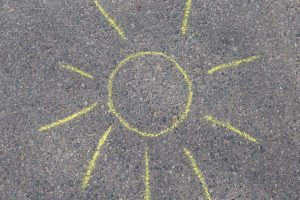
Siuyin’s troubles began in the most familiar of places — home. Like many teenagers, she found herself at odds with her mother’s rules. Arguments over curfews, mobile phone use and daily restrictions turned their relationship into a battlefield. The more her mother tried to enforce boundaries, the more Siuyin pushed back. By the time she entered middle school, the divide between them had become a chasm.
As a result, Siuyin turned to her friends, finding in them more understanding. The streets became her refuge, where late-night drinking and smoking sessions replaced family dinners, and clashes with other street kids became her new life.
After a routine gathering at a stranger’s house one night, which resulted in a fight, Siuyin’s mother found her in a police station. Despite their years of conflict, it was her mother who took charge, ensuring that her friend received medical attention and guiding her away from the ruins of that night.
The incident was a turning point. For the first time, Siuyin saw the consequences of her rebellion not just for herself, but for those around her. Stripped of her bravado, she began to realise that she needed help. With support from a social worker, Siuyin and her mother started to rebuild their relationship.
During conversations with her social worker, Siuyin picked up a childhood passion for art, particularly drawing. She had always been fascinated by tattoos, admiring their ability to tell personal stories through ink. She enrolled in a tattoo apprenticeship programme. Drawing provided her a world away from the chaos of the streets, and reignited her creativity, discipline, and patience. Her mother did not stand in the way of her decision to drop out of school and to make a living by doing something that she was passionate about.
The hardest part of resuming a normal life for Siuyin was adapting to a life with new rules, including returning home at a reasonable hour and keeping in regular contact with her mother. Now, instead of seeing these rules as curtailments to freedom, she saw them as her mother’s concern, love and care. She felt that she was building up stability and a focus.
Now, Siuyin is a professional tattoo artist. The precision and focus of tattoo art requires creativity and energy. She has found deep meaning in the art, appreciating the significance that each tattoo held for its wearer. Her favourite design is the sun: a symbol of strength, warmth, and love.
One of the tattoos she is most proud of is the one that features a sun, just like hers, accompanied by Morse code spelling out, “You are love.” It was done on her mother. ■
Please note that the names of the interviewees mentioned are fictional and have been created solely for the purpose of protecting their privacy and identity.


